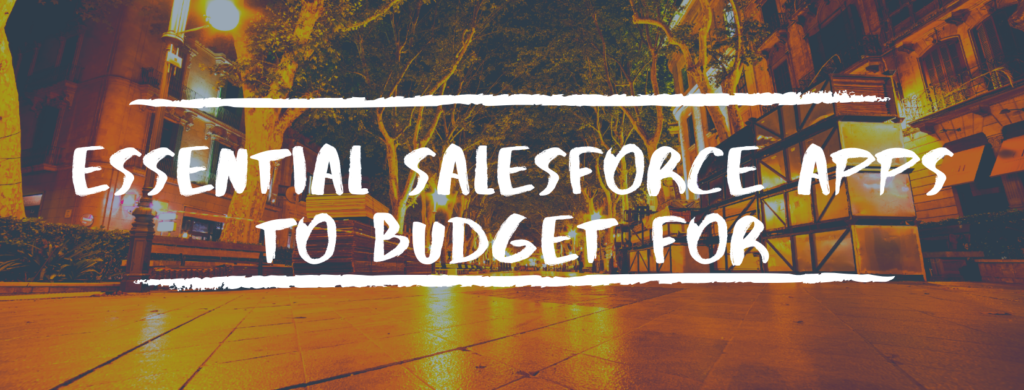
Essential Salesforce Apps to Budget for
 I frequently help customers at the decision and procurement stage for Salesforce and have created a quick blog to help you make sure you budget for essential Salesforce Apps. These apps are suitable for any organisation but have a focus towards charities and SMEs:
I frequently help customers at the decision and procurement stage for Salesforce and have created a quick blog to help you make sure you budget for essential Salesforce Apps. These apps are suitable for any organisation but have a focus towards charities and SMEs:
1. Apsona Data Management (Apsona for Salesforce), $540 / year for up to 3 users (discounted to $375 for non-profits)
I consider Apsona for Salesforce a must-have app – it will speed up your data imports considerably which is essential during a data migration and is also helpful if you are likely to need ongoing CSV/Excel imports. Have a look at my blog which outlines why I prefer Apsona for Data Imports. Apsona are also a very helpful company to work with who are well versed in non-profits (Apsona for Salesforce works with the Non-Profit Success Pack, NPSP), for more information have a look at the Apsona website.
How does the Apsona pricing work?
The pricing is not based on your total number of Salesforce users – you can assign the users who need Apsona access, for example, your org could have 20 users but you could pay for up to 3 of those to have Apsona access.
Is there a free trial available?
There is a fully functional 30-day free trial available for Apsona for Salesforce.
Are there other complimentary products?
There are a whole suite of Apsona products out there – you may want to build these into your budgets at the outset. The following Apsona products all require Apsona for Salesforce:
– Apsona Dedupe and Match (see separate listing below)
– Apsona Multi-step Reporting ($540 / year for up to 3 users + Apsona for Salesforce) which can report across any number of objects and join across any fields
– others, such as Apsona Email and Document Merge, Apsona Charting and Dashboards, Apsona Batch Gift Entry and Scheduled reports.
2. Form Assembly, Professional edition ($99 / month), ideally purchase the Premier Edition ($249 / month) which has the advanced Salesforce connector. There is a 10% discount if paid annually and a further 20% discount for non-profits.
Form Assembly is a highly recommended app in order to generate forms and collect data that can be written back directly into Salesforce. If you have a website form and are using Salesforce I’d consider Form Assembly a must-have purchase – unless your needs can be met with a very simple ‘web-to-lead’ form available as native Salesforce functionality.
Form Assembly has numerous use cases – for example, capturing interest from your website, creating registration forms for events (with payments as it can integrate with things like PayPal, Stripe etc.), pledging campaign support, capturing donations with gift aid etc. The ability to connect your website form to multiple Salesforce objects means that pretty complex data capture is possible, writing it right back to the place you want the data in Salesforce.
How does the Form Assembly pricing work?
The price is per user but not based on all the users you have – for example, in a small organisation, you could allocate one user to be responsible for Form Assembly and have them set up and manage the forms on behalf of the organisation.
Is there a free trial available?
There is a 14-day free trial available.
3. Zapier, Starter Edition ($25 / month) or ideally the Professional Edition ($62.50 per month if paid monthly), or Professional Plus for higher data volumes ($156.25 / month). There is an annual discount available and 15% non-profit discount available on all plans.
Wouldn’t it be lovely if the same tool could fulfill all your requirements? That’s not always possible – for example, you might be using Eventbrite to manage your events, WooCommerce to take orders on your WordPress website and Salesforce as your CRM. In order to send the customer data from apps like Eventbrite or WooCommerce into Salesforce, you can use Zapier which connects hundreds of apps with Salesforce.
Zapier only works for new data – for example, once you’ve set up the Zap, a new Eventbrite booking will be sent to Salesforce, but for historic bookings you’ll need to do a data import (or use Zapier with the Google Sheets integration).
4. A De-Duplication Tool such as Apsona Dedupe and Match ($750 / yr for up to 3 users + Apsona for Salesforce), or a more expensive tool. There is non-profit pricing available for Apsona Dedupe and Match ($495 / year for up to 3 users).
Apsona Dedupe and Match is a very helpful App to allow you to find and mass merge duplicates in Salesforce – as well as setting the match fields, you can also set the priority for which field should be the keep/master in the final record. You can also merge based on an input CSV (e.g. you can limit your merging work to a priority list). This or a tool like it is essential for organisations who are likely to be battling against duplicates, such as those where customers can register or purchase online, or where data may come from multiple sources.
Other de-dupe tools include:
– DemandTools ($5,940 per month minimum based on the Appexchange listing which is 5 USD per user per month based on a minimum of 99 users)
– Cloudingo ($2,146 per annum for the Standard edition which includes mass merge – this is the pricing for up to 100,000 records which is counted as leads, contacts, accounts and person accounts)
5. Rollup Helper, free version provides 3 active rollups, paid edition is $1560 per org per year (there is a 30% non-profit discount available)
There will be times when you want to display and report on information at the Account level that is based on objects further down the chain (such as Opportunities and Custom Objects) – for example showing the total sales amount for a particular product on that organisation’s page. In Salesforce these are called Rollup fields – you can create rollups with native Salesforce functionality but there is a limit of 25 per object (e.g. 25 limit on the Account).
Rollup helper offers a user friendly interface to create rollups and they work in real time (unlike using Process Builder which would have a short delay) – any rollups created in Rollup Helper don’t contribute towards your limit of 25. Rollup Helper isn’t limited to Master-Detail relationships, it can rollup any information from a child (e.g. custom object) onto the parent account.
I think it’s certainly worth considering whether your organisation would benefit from Rollup Helper and potentially having budget available should the need arise.
Do I need this?
In small organisations or ones which don’t have a lot of sales type data you might not need it at all, opting to use native Salesforce Rollups when required, but it’s likely for medium sized organisations it would be very helpful/essential in enabling targeted marketing and management reporting.
How does the Rollup Helper pricing work?
The pricing is nice and simple – one price per organisation (unlimited admins and end-users). For more information on the pricing, have a look at the Passage Technology’s Rollup Helper pricing page.
6. Direct Debits (for UK charities)
If you are a UK Membership organisation or a charity looking to take monthly donations through your website, then a paperless direct debit integration is a must for your Salesforce project. It’s important to factor this into your pricing as it’s not part of the standard Non-Profit Success Pack Salesforce package.
A few Apps to consider are:
– Rapidata which use the Brickwork app for the integration, the Rapidata costs are on a per month basis plus a percentage of the transaction (e.g. £30 per month excluding VAT with a transaction fee based on volume such as 30p excl. VAT per transaction). Brickwork is the integration app which is free on the appexchange.
– Sagepay by Income Systems, which starts at £10 per user per month but also requires a SagePay account
– Asperato, which starts at £380 per company per month
Summary
The right Salesforce Apps make or break your Salesforce implementation and user adoption. Make sure you make your own list of your essential Apps prior to purchasing Salesforce and have a think about whether it should include the following:
- Apsona for Salesforce for data management and easy importing, $540 / year for up to 3 users (discounted to $375 for non-profits)
- Form Assembly for all your online forms ideally Premier Edition ($249 / month) which has the advanced Salesforce connector (10% discount if paid annually and a further 20% discount for charities). Don’t forget to factor in payment processing if your Form Assembly forms need to integrate with a payment processor such as PayPal or Stripe.
- Zapier to help you pass data into Salesforce from third party systems such as Eventbrite or WooCommerce, Professional Edition ($62.50 per month if paid monthly)
- A de-duplication/merging tool such as Apsona Dedupe and Match ($750 / yr for up to 3 users + Apsona for Salesforce), or a more expensive tool to help you keep you retain ‘single customer view’
- Rollup Helper to help you summarise information at the Account level based on Opportunities or Custom Objects, in order for that information to create reporting or be used in targeted marketing, free for 3 active rollups, or $1560 per organisation per year for the Premier Edition (unlimited rollups and priority support).
- Direct Debits (for UK charities) – pricing dependent on your chosen product and volume.
Finally, for your budget setting, consider whether you can manage these Apps in-house or will need Salesforce consultancy support.
What Salesforce apps would you add to this ‘must have’ list?

0 Comments on "Essential Salesforce Apps to Budget for"